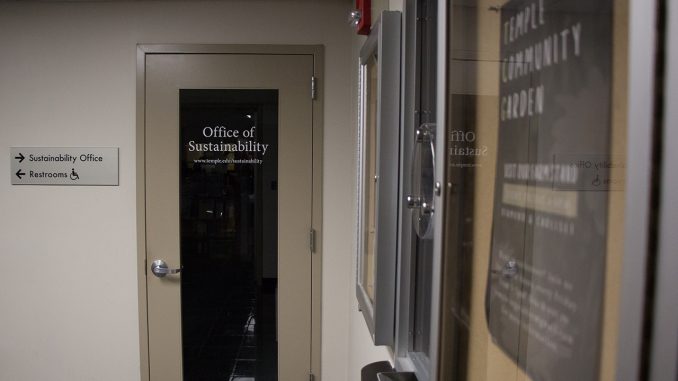
Temple University signed on to a regional partnership, sponsored by the city, aimed at improving sustainability among Philadelphia-area nonprofits, businesses and universities.
The Climate Collaborative of Greater Philadelphia, announced by the city on Oct. 4, encourages organizations to share information with one another about how to implement sustainable infrastructures within their own networks, said Rebecca Collins, Temple’s director of sustainability.
“I think it was kind of born out of this need of, like, climate change is real,” Collins added. “It’s happening now. We need to do something about it. We need to address it.”
“We have these goals, but we also have these other pressures and these things to consider. One of them being economics, or business,” Collins said.
The collaborative, which will host a series of workshops and informal meetups, emerged from the city’s need to be able to field many questions surrounding sustainable infrastructure from a variety of organizations, Collins added.
“They identified a need that everybody needs to get together, they need to have this arena to talk through things,” she said.
A spokesperson for the Philadelphia Office of Sustainability did not respond to a request for comment.
“The collaborative prioritizes the sharing of best practices, case studies, and other resources to support the climate action of regional institutions,” the collaborative’s website reads.
Partners include the African-American Museum in Philadelphia, Fairmount Park Conservancy and Saxbys, its website reads.
The University of Pennsylvania, Community College of Philadelphia, Rowan University and Pennsylvania State University also signed on, the website reads.
To join, organizations must reaffirm their commitment to fighting climate change publically and develop a climate plan, Collins said.
In April, Temple announced an updated Climate Action Plan aimed at reducing the university’s carbon emissions by 80 percent by 2050 by making its facilities more energy-efficient.
Temple has already shared with the group some of its knowledge surrounding power purchasing agreements, which are contracts between producers and buyers of solar energy, and can offer expertise on sustainable facilities management in the future, Collins said.
John Martini, an executive partner at the Philadelphia office of Holland & Knight, a national law firm which is a member of the collaborative, said his branch sponsored the first workshop on Oct. 17 and sent lawyers with knowledge of power purchasing agreements.
Holland & Knight will also provide free legal services related to sustainability to participating organizations, according to the collaborative’s website.
“It’s wonderful to see municipalities sharing information in this way because they care about the common cause, and no one entity can make changes on its own,” Martini said.
Elizabeth Brown, the director of the Delaware River Watershed Programs for Audubon Pennsylvania, a branch of the national bird preservation organization that is a part of the collaborative, said addressing climate change requires a comprehensive approach.
“We’re taking our science and sort of our expertise and looking at it from a lot of different angles, and also looking at solutions,” Brown said.
“Challenging everyone in the system to sort of be part of the solution, I think, is a great opportunity for an organization like Temple,” she added.



Be the first to comment